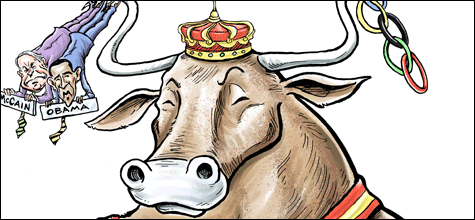
Illustration by Chad Crowe.
For the next month, self-important columnists will station themselves in Beijing and argue over which country established itself as the world’s biggest sporting superpower this summer — the United States, China, or maybe even Russia.
But — news flash — the contest is already over. The winner is (drum roll, please) . . . Spain. This surprise sporting development tells us something about the diminishing role of the Olympic Games in the modern sports world, the power shift going on in Europe, and even something about the state of the current presidential campaign.True, Spain won’t win all that many medals at the upcoming Games — but that’s beside the point. Despite all the hype about to smother the planet like a Beijing smog cloud, the Olympics will soon be unmasked as the overrated spectacle it is — one that is also long past its modern heyday, which occurred in an era when there were few other international competitions.
Today, of course, is much different. In terms of the intensity of worldwide interest, the Olympics pale in comparison with such events as soccer’s World Cup, and even the world cups for cricket and rugby. In the US, the Olympics do draw decent ratings, but mostly from a non-traditional-sports-fan demographic (i.e., women), attracted to both the “up close and personal” network portraits of the athletes and the focus on events that seem less physical than conventional sports (i.e., gymnastics).
But this year, even the patience of traditional US Olympics fans will be tested. Because of the 12-hour time difference between Beijing and the East Coast, most of the winners will be known via the Internet long before the events themselves are actually telecast here. Meanwhile, the audiences for any network television event are diminishing by the year — thanks to competition from the Web, cable, and other outlets.
So, even if the Chinese emerge as the upstart athletic power they have been quietly boasting they are, or the US once again fends off all challengers, fewer are likely to care than ever before — outside of China, of course.
A new armada
On the other hand, the Spanish have already won this summer’s triple crown, a feat that hardly raised a flicker of interest in the States, but that in many other parts of the world counted for a lot more than a bushel-full of Olympic hardware.
In late June, Spain captured the coveted European soccer championship for the first time since 1964. (It’s the third-most watched sporting event in the world, behind the soccer World Cup and the Olympics, according to Ted Wyman, a Canadian columnist.) Two weeks later, Rafael Nadal won Wimbledon for the first time, the first Spaniard to do so since Manuel Santana in 1966. (That’s the 10th-most watched sporting event in the world.) And, a weekend ago, Carlos Sastre won cycling’s Tour de France, the first Spaniard to do so since 1988. (The ninth-most watched sporting event in the world.)
This trifecta is more than just a sports story in a nation of 45 million, which has only known democracy for around 30 years — it’s a coming-out party. A columnist in a leading Spanish paper, El Pais, theorized, in all seriousness, “The first generation of Spaniards born into a democracy are on average nine centimeters taller than those born in the first years of the dictatorship.”
The wins have also provided an enormous boost of confidence in a nation that, until now, was more known throughout the Continent for its internecine strife between regions — Catalonia vs. Madrid vs. the Basque Country vs. Galicia, etc. — than any national accomplishments. (Hence, the old joke, “Three Spaniards, four opinions.”) Those divisions haven’t disappeared by a long shot, and like much of the world, the country is currently facing tougher economic times. But the emergence of Spain as a mini-power (it recently surpassed Italy in annual GDP) does demonstrate that, in the new integrated Europe, the old superpowers are now often finding themselves competing for power and glory with such rejuvenated former laggards as Ireland and Spain.
Which brings us to the current presidential campaign. Barack Obama recently returned from a celebrated international tour, where he stopped in Germany, France, and England. Alas, it was a political sightseeing trip better suited to the politics of the continent a century ago, before the outbreak of World War I. No Spain, no central Europe, not to mention no East Asia. Obama’s “New World” looked an awful lot like the old one.
And then, there’s the matter of the Olympics. Both Obama and John McCain are said to be mostly suspending their campaigns during mid August, afraid of competing with this “mega-event.” In truth, the Olympics are no longer serious competition for most anyone’s attention. The candidates can name their vice-presidents, schedule a barnstorming tour, and do pretty much anything they want over the next few weeks, secure in the knowledge that the games of the 29th Olympiad will not be a major diversion. Except for those journalists stuck in Beijing. And, of course, the Chinese.
THE FIELD
Odds
JOHN MCCAIN 6-7 │ this past week: same
BARACK OBAMA 7-6 │ this past week: same
To read the “Presidential Tote Board” blog, go to thePhoenix.com/blog/toteboard. Steven Stark can be reached atsds@starkwriting.com.